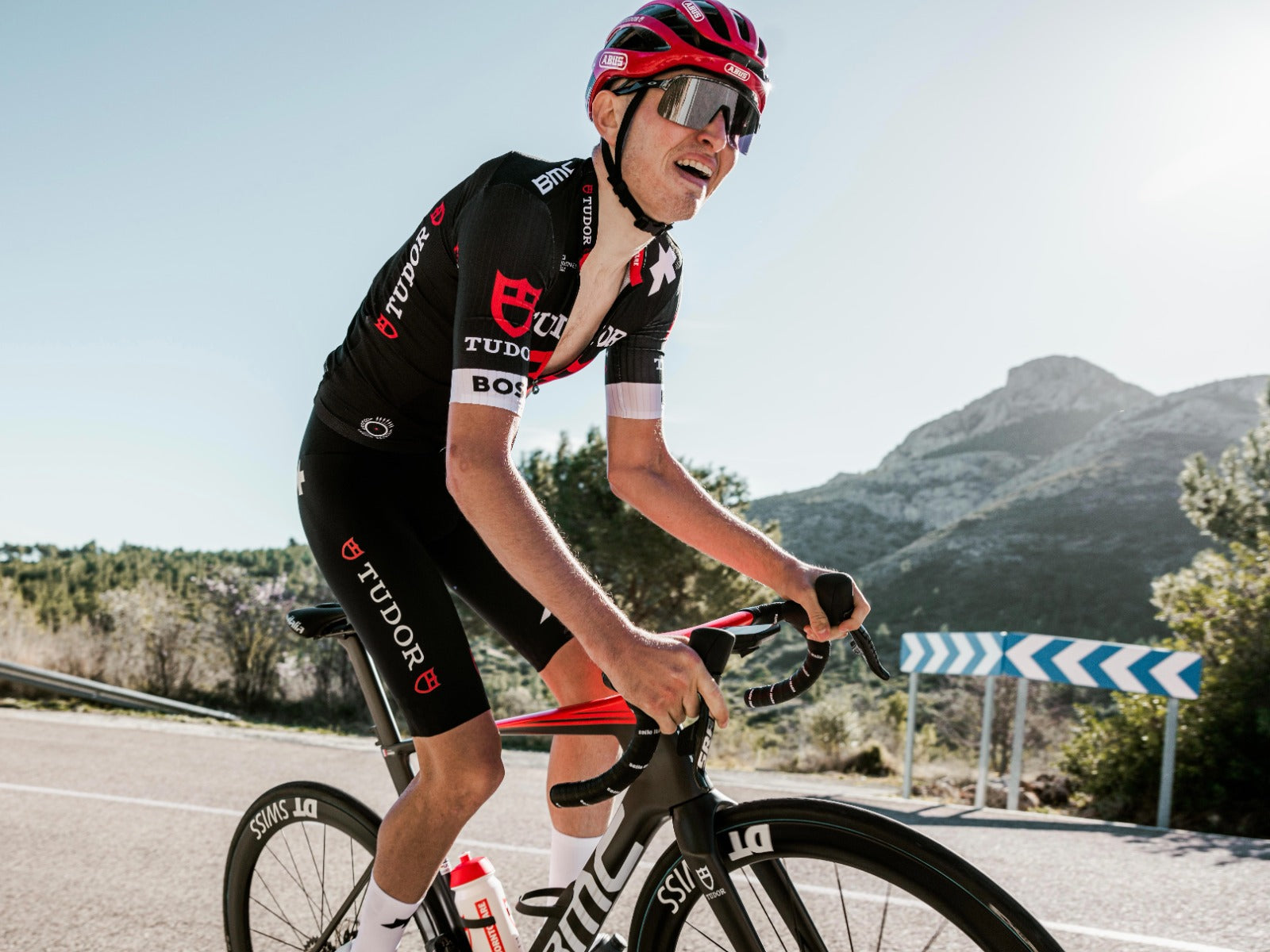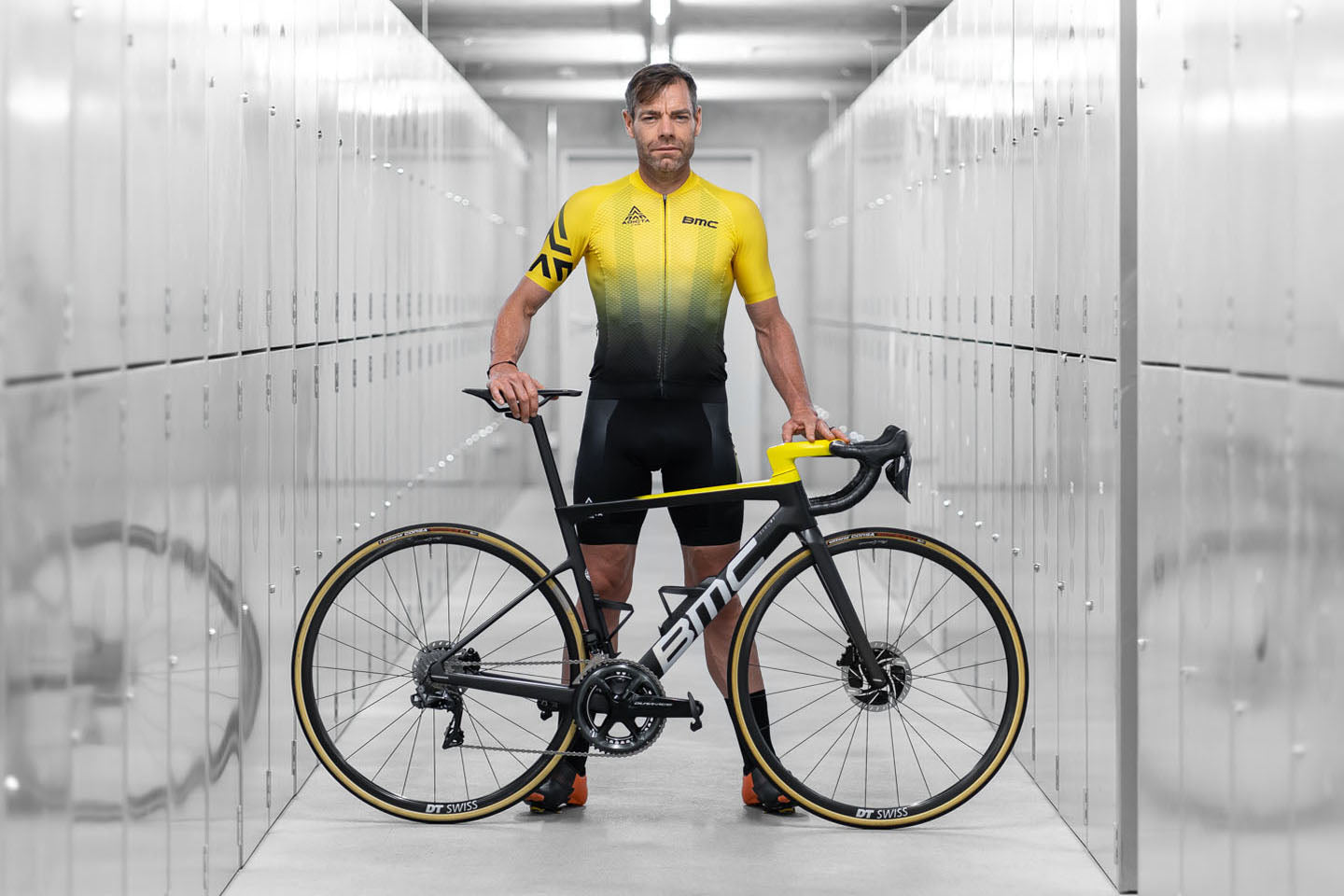An exclusive insight in Tudor’s development program with Mathys Rondel

Mathys Rondel is in the middle of a long-term development process with Tudor Pro Cycling. The Giro d’Italia Next Gen, Rondel’s main goal of the season, is more of a quest for confirmation rather than a race where he desperately has to perform. The 20-year-old exemplifies the ‘Swiss Human Performance’ approach to talent development in Tudor Pro Cycling’s U23 Team. BMC delved into how the development process works in the Swiss team on BMC bikes.
Rondel signed a contract until 2027 with the Swiss pro-continental formation, which his trainer Sebastian Deckert says is representative of Tudor’s commitment. “We have a long-term plan with him.”
Matterhorn
Both rider and trainer state that the Giro d’Italia for under-23 riders is only “a step in a long process.” Deckert compares it to climbing the Matterhorn, a famous mountain in Switzerland, saying, “We do not know how far we can get with Mathys, but we can approach it step by step. The ‘Baby Giro’ is one of those steps.”

The German trainer continues, “Mathys, of course, at his age, has a lot to learn. The team continuously challenges him to get as much as possible out of the learning process. Every time, we give him a bit of an unknown experience, both physically and in all other aspects that intersect with professional cycling.”
“For instance, last year, Mathys was a support rider in the Giro d’Italia Next Gen. That’s how he learned about the demands of a week of racing without having to focus every day. The next step came in the second part of 2023 when he became the team leader himself in Tour Alsace. He also raced with the pro team for the first time in Piemonte and Veneto, learning from more experienced riders. Earlier this year, he rode with our professional team again, in Coppi I Bartali and in the Tour of the Alps. Now, he is our team leader in the Giro d’Italia U23.”

“All these steps toward the Matterhorn, metaphorically speaking, are leading to participation in a Grand Tour in the future.”
Luxerious position
Rondel and his companions in the U23 squad of Tudor are not only challenged physically. The technical aspects, such as positioning on the BMC Timemachine, are another process Rondel and Tudor are working on. Additionally, nutrition, tactical knowledge of bike racing, and the mental side of cycling are continuous learning processes in becoming a pro-cyclist.
Rondel realizes he is in a luxurious position with Tudor. “We can indeed take it step by step, also because of my contract situation, and I am happy with this approach. Like Sebastian said, I still have a lot to learn, and I do realize that. Physically, I like to believe I might be on the level of being part of the professional team. However, I have to learn more about living as a pro cyclist, reading races, and making the right tactical choices. Therefore, mixing races between the development team and the professional team is, I think, a good approach. Just like taking it step by step, as we are doing. I learn from races like the Tour of the Alps, with riders like Michael Storer, and then apply it myself with the U23 team, like this week in the Giro d’Italia.”

The French 20-year-old trusts the process that Tudor and their technical staff have devised for him. “Around me, there is a team with experienced and skilled staff. Everything feels smooth, and I see the results of the process regularly. I completely trust them.”
Giro d’Italia Next Gen
Even though Tudor Pro Cycling has “bigger plans for him” than just the Giro d’Italia Next Gen, one of the biggest races for U23 cyclists is “only an intermediate step in a long-term development”, it is an important test. Deckert: “You cannot just rely on TrainingPeaks’ numbers. Racing is not only about the watts. In addition, some races have specific demands, and the ‘Baby Giro’ in particular has a specific course.”

The trainer explains: “The stages this week are relatively short. As we are preparing Mathys over many years to race for a good result in the general classification of a Grand Tour, his training focuses much more on races longer than the 130 kilometers on average in the Giro d’Italia this week. In that sense, you could say that we sacrifice short-term success for - hopefully - long-term success. We strongly believe in his potential. Also, who is still asking for your grades in elementary or high school? Probably no one - and this is how we look at this week’s racing too: it is a fantastic window of opportunity, testing and figuring out how much progress we have made over weeks, months, and years on all different levels. It is also a great opportunity to learn and adjust our plans for the near and far future. The Giro d’Italia Next Gen remains, in that sense, one step closer to the top of the Matterhorn.”
High chronic expedenture
Either way, the shorter stages suit Rondel well at the moment, as one of his “weaknesses,” according to him and his trainer, is the so-called high chronic expenditure. Rondel’s trainer explains: “GC-riders in Grand Tours are excellent at consistently spending a lot of energy and calories day in and day out while performing at their best. This is where we see that Mathys can still improve. On one hand, being skilled enough to race Grand Tours for the general classification comes with age, but we are obviously training him for that.”
Deckert continues: “We increase his training load step by step, whether it is the number of hours spent in one day on the bike, the number of hours and intensities in a week, and over an even longer period of time. This we increase step by step. This ultimately also defines professionals from amateur cyclists: they can both do a five-hour ride with intervals or train thirty hours a week. However, we are training Mathys to do such rides and training weeks for a long period of time, while the amateur cyclist might get tired quicker.”

Rondel agrees with his trainer. “I also believe that this is the approach I need. The high-intensity numbers that I have are good, I think, particularly for a climber like me. The consistency of performance, as Sebastian says, is what I should work on. I only started cycling four years ago, so I did not have as much training load as others my age, but I am making up for it, and that is part of the process.”
Next steps onto the ‘Matterhorn’
A good performance in the Giro Next Gen would be a nice confirmation for Tudor’s climber on the BMC Teammachine. In his own words: “First I want to perform in this Giro Next Gen. I want to win a stage and win the General Classification. I have done this race before, so there are no little secrets left. I am confident that I can perform here, based on how my season has been going so far.”
The week of racing in Italy is not only Rondel’s main goal; his teammates and staff have also been working towards the Giro d’Italia Next Gen. “In that sense, I hope I can deliver good results to everyone who has been so closely involved with this learning process and to my teammates who also worked hard to be at their best this week. I do not feel the nerves so much, but I do very much want to perform for them.”

So what’s next for the 20-year-old of Tudor after Giro Next Gen? What are the next steps onto the metaphorical Matterhorn?
Deckert: “We will closely monitor how Mathys recovers from the Giro. The legs will speak, but the next step could be an altitude camp. He has not been on one before. However, it also depends on how he feels after this race. The ‘Swiss Human Performance,’ what Tudor Pro Cycling stands for, is very relevant to him. It is fantastic to work with talents like him.”
Text by: Sjors Beukeboom





